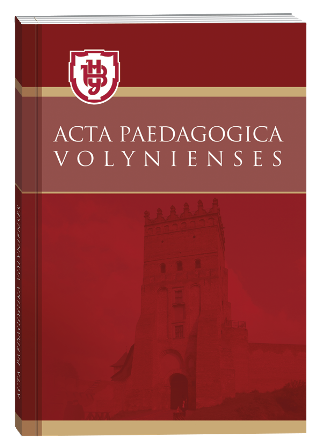SYSTEM OF PROFESSIONAL MOTIVATION AND VALUE ORIENTATIONS OF FUTURE FORESTRY PROFESSIONALS
DOI:
https://doi.org/10.32782/apv/2021.6.28Keywords:
system, professional motivation, value orientations, future specialists, forestry, needs, training, values.Abstract
Goal. The article substantiates the system of professional motivation and value orientations of future forestry specialists. Methodology. It is established that the system of professional motivation and value orientations of future forestry specialists contains interests, needs, motives for acquiring knowledge, skills, competencies in the professional sphere, positive attitude to future professional activity, understanding the value of forester’s work, awareness of social significance of his profession. a specialist in forestry of the necessary qualities, the desire of the future specialist to creative work in the field of forestry; ability, a sense of love for nature. Scientific novelty. Creating a system of professional motivation, attention is paid to external motivation, which is based on the use of various incentives, which directs the applicant to a motivated mastery of professional knowledge, skills, abilities, competencies; intensification of cognitive activity in the process of professional training and internal motivation, based on the internal motivations of applicants aimed at meeting personal needs for self-realization in the forestry sector. It is revealed that the motivational-personal sphere reflects a set of fundamental ideas and priority values, requirements that determine the worldview, ideology, a set of general provisions that reveal the content of personality training. Personal values are a kind of holistic construct of readiness for professional activity, which characterizes the importance of certain goals, feelings, actions for the individual. Conclusions. The components of the system of professional motivation and value orientations of future forestry specialists are inserted. These include the motives that are most important for the inclusion of applicants in the training process: socially significant and cognitive. It is determined that value orientations are the most important element in the internal structure of the individual, are fixed by life and professional experience and are a set of experiences of the individual, as well as separate the importance of phenomena and objects for a particular person. Formed and established value orientations form a certain core in the consciousness of the individual, which ensures its stability, a certain type of behavior and activities, the orientation of needs and interests.
References
Васильева Т.В. Формирование профессиональных ценностных ориентации студентов сельскохозяйственного вуза на современном этапе развития общества : дис. канд. пед. наук. Кемерово, 2015.
Герасимова І. Критеріально-рівнева структура готовності до виявлення професійної мобільності майбутніх випускників аграрних ВНЗ. Сучасні освітні технології у професійній підготовці фахівців аграрного профілю. Вінниця. 2015. С. 16–30.
Гриджук О.Є. Теоретико-методичні засади формування мовнокомунікативної компетентності майбутніх фахівців лісотехнічних спеціальностей : дис. д-ра пед. наук. Херсон, 2018.
Каричковський В.Д. Теорія і практика професійної підготовки майбутніх менеджерів в університетах аграрного профілю: порівняльний аналіз : дис. д-ра пед. наук. Київ.
Картешкина О.Л. Педагогическое обеспечение профессиональной подготовки будущих специалистов сельского хозяйства в региональном вузе : дис. канд. пед. наук, 2009. Благовещенск.
Лаппо В.В. Формування духовних цінностей студентської молоді в начально-виховному процесі вищого навчального закладу : теоретико-методичні засади. Івано-Франківськ.
Леонтьев А.Н. Деятельность. Сознание. Личность. Москва, 1975.
Маслоу А.Г. Мотивация и личность. Санкт-Петербург, 2003.
Онопрієнко В.П. Теоретико-методичні засади екологічної підготовки фахівців сільського господарства : автореф. дис. д-ра пед. наук. Київ, 2011.
Пашин В.И. Дидактическая система обучения студентов колледжа специальным дисциплинам сельскохозяйственного профиля : дис. канд. пед. наук. Нижний Новгород, 2002.
Реан А.А., Бордовская Н.В., Розум С.И. Психология и педагогика. Санкт-Петербург, 2005.
Рубинштейн С.Л. Основы общей психологии. Санкт-Петербург, 2005.
Самохвалова О.М. Развитие информационно-технологической компетентности будущих инженеров лесного хозяйства на основе интегративного подхода к обучению дисциплинам информационной и предметной подготовки : дис. канд. пед. наук. Омск, 2008.
Сучкина Н.Н. Педагогические условия формирования ценностного отношения студентов аграрного колледжа к профессиональной деятельности : дис. канд. пед. наук. Курск, 2003.
Хуторской А.В. Практикум по дидактике и методикам обучения. Санкт-Петербург, 2004.
Чеботарева Е.С. Развитие самообразовательной компетентности студентов в процессе проектной деятельности (на материале подготовки будущих специалистов агропромышленного комплекса) : дис. канд. пед. наук. Курск, 2010.
Шматков Е.В., Шматков Д.І. Використання моделювання при навчанні учнів професійно-технічних навчальних закладів робітничим професіям. Теорія і практика управління соціальними системами. 2009. № 2. С. 50–54.







